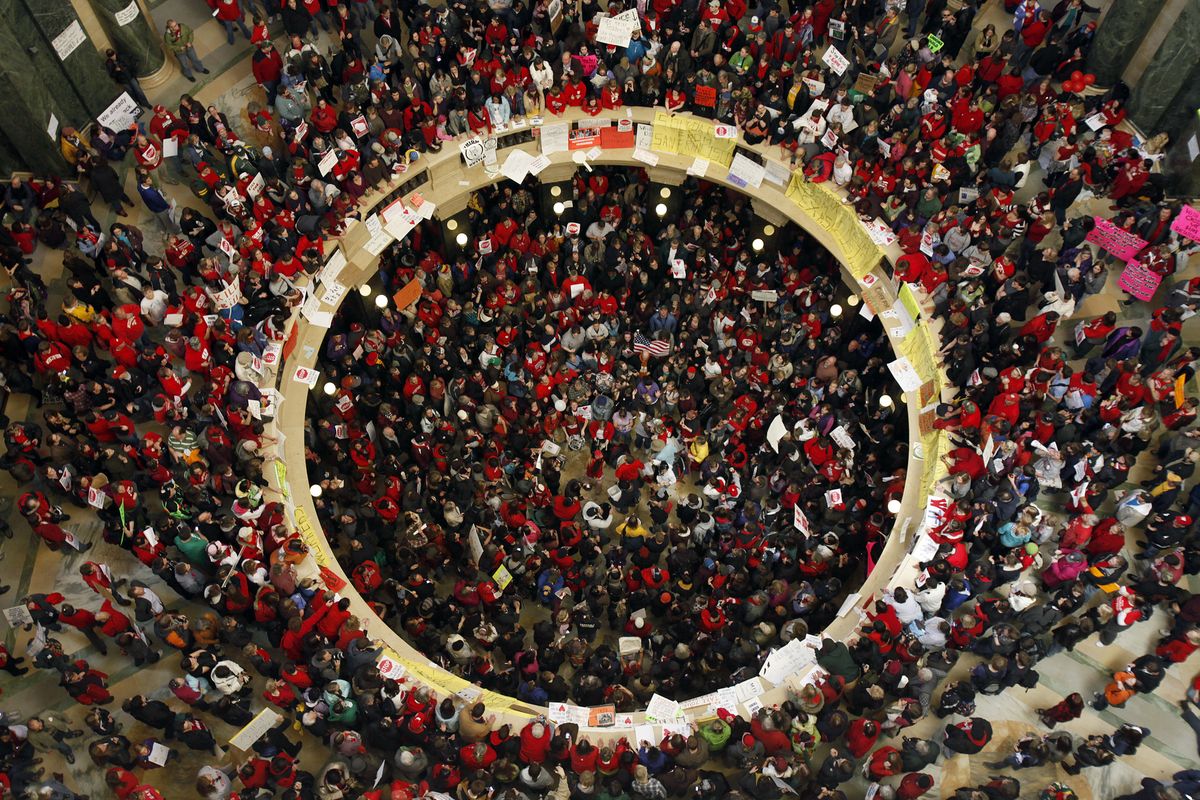Love for labor lost across the Midwest
Rust Belt at the vanguard of backlash against unions

The nation’s Rust Belt once ran on union power, its factories and steel mills employing Democratic-voting union members who enjoyed regular pay raises and good pensions. Now the region is at the vanguard of a national backlash against organized labor, as newly elected Republican governors and legislatures try to control costs by weakening – or virtually eliminating – unions of government workers.
In Wisconsin on Friday, there was no end in sight to an impasse that paralyzed state government, as Democratic legislators vowed to stay out of the state to defeat an attempt by Gov. Scott Walker to remove collective bargaining rights from government workers. Tens of thousands of protesters continued to throng the state Capitol.
The upshot is a pitched battle between the old base of the Democratic Party – organized labor – and the new base of the Republican Party – the fiscally conservative, small-government activists who drove the GOP to success in the November elections.
Across the Midwest
Nearly identical measures are advancing in Ohio and Iowa, while Michigan and Indiana are exploring other ways of limiting unionized government workers’ protections. All this is happening in states that have been hit hard both by the recession and the loss of union jobs over the decades.
“What happened is the destruction of private sector unionism in the Rust Belt – the levels of private sector unionism in Wisconsin and Ohio is what it used to be in Mississippi,” said Nelson Lichtenstein, director of the Center for the Study of Labor, Work and Democracy at the University of California, Santa Barbara.
Most remaining union members are government employees, whose standards of living haven’t fallen like their private sector counterparts. “Now there’s a social resentment,” Lichtenstein said. “When there are only scattered islands of unionism, they stand out.”
Obama takes position
President Barack Obama, who has clashed with teachers unions and other government unions, has thrown in behind organized labor in this battle. Prominent Republicans – from House Speaker John Boehner, R-Ohio, to former Minnesota governor and aspiring presidential candidate Tim Pawlenty – have slammed Obama and backed Walker.
“We’re seeing a test of how serious the public at large is willing to go along with the tea party express,” said John Gilliom, a political science professor at Ohio University. “It’s a live political science experiment.”
That’s what drew Obama into the fight. His campaign operation, now known as Organizing for America, has been coordinating with union leaders protesting the bill in Wisconsin and those battling similar proposals elsewhere in the Midwest.
The stakes are high for the president, whose party was routed in the region during the Republican tidal wave in November. He needs critical swing states like Ohio, Michigan and Wisconsin to win re-election. And if those states’ remaining unions are decimated, analysts say, that will be much harder.
Financial pressures
Across the country, governors of both parties are battling public employee unions to win concessions on pay, benefits and, most significantly, pension contributions. There are undeniable financial pressures: States face as much as $6 trillion in pension liabilities to government workers, whose unions negotiated generous pension benefits in lieu of high salaries over the decades.
Either taxpayers will have to foot that bill or union members will have to take a haircut, said Robert Novy-Marx, who studies government pensions at the University of Rochester. “So the unions are representing interests that are diametrically opposed to the taxpayers.”
The tension is developing as the public’s perception of unions is at its lowest level in 25 years. A poll from the Pew Research Center released this week found only 45 percent of Americans had a positive view of organized labor.
But Pew’s Carroll Doherty noted that 61 percent still believe unions are needed to improve working people’s lives and that a plurality favors unions over governments in labor disputes.
In Wisconsin, however, surveys have shown that more than 60 percent think public sector unions should make concessions on benefits and pensions. Analysts elsewhere say there is similar resentment simmering across much of the Rust Belt, which has sky-high unemployment and where private sector union workers have made concessions to keep their jobs.
Governor’s proposal
Unions in Wisconsin and elsewhere say they’re willing to make concessions, but that approaches like Walker’s go too far by virtually dissolving organized labor in government.
Walker’s proposal would force government workers to pay half their pension costs and 12 percent of their health costs. Most significantly, it would also bar them from collective bargaining and prevent government workers from getting raises above inflation without approval in a public referendum. Every year, annual votes would be taken of union members to see if the union could continue.
Charles Franklin, a political science professor at the University of Wisconsin, said that while the public agrees with Walker on the need for concessions, “my impression is there’s much less support for de-unionizing the state.”